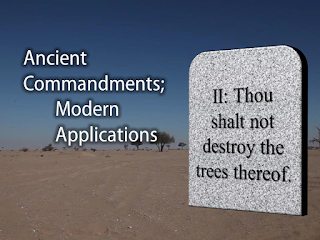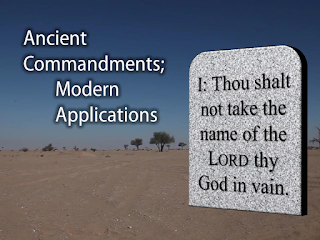Hespeler, 3 July, 2016 © Scott McAndless
Deuteronomy 20:10-20, Matthew 5:21-26, Psalm 72:1-14
Two days ago, Canadians everywhere stood up a little taller, threw their heads back a little further and stuck their chests out a bit more as their hearts swelled with some well-founded pride. But as they heard or sang the noble tones of the Canadian national anthem, it was quite possible that some felt a little stirring of frustration in their patriotic hearts because, if you have been paying any attention to national affairs lately, you know that there has been talk of that thing that fills the hearts of all Presbyterians with fear and dread. There has been talk of change.
Now, I have absolutely no intention of getting into the middle of a discussion about whether or not Canada ought to change the words of its national anthem. I’ll let others argue and fight over the virtues and vices of change. I just mention it (with some trepidation) because it leads us to an issue that I do want to raise. All the discussion has focussed our attention on one line that we all learned like this: “True patriot love in all thy sons command.” My question is this: whether or not we all want to be called “sons,” what does “true patriot love,” look like today and what does it mean to “stand on guard” for our country?
When those words we are presently disagreeing over were first added to the anthem (and, no, they aren’t actually the original English words, they were changed in 1914), at that time I think that people had a pretty clear understanding of what they thought “true patriot love” looked like. It seems very likely that that a reference to “sons” was added as a way to boost the recruiting of the young sons of Canada to go and stand on guard for their country in the battlefields of the Great War in Europe.
And, while I know that we would offer nothing but praise for the sons and daughters of Canada, past and present, who have served their country in the military, surely none of us would suggest that that is the only way to give patriotic service to your country. So I think, in the aftermath of Canada Day 2016, we have to be willing to ask what are the best ways for us to stand on guard for our country today.
There is a commandment in the Book of Deuteronomy that I think might be helpful to us as we think of these things. It comes in the midst of a section that is all about war, sieges and other not-so-pleasant stuff. There is a whole lot of it that would be absolutely unacceptable today: attacks, wholesale slaughter and mayhem.
I included that part of the passage, not because if find it admirable, but because it is a fair depiction of what people back then were dealing with. It was generally accepted that this was the kind of stuff you had to do in that world to stand on guard and preserve your country. Taking care of your country meant that there would be a difficult struggle in which some people would be hurt. I’m not saying that was wonderful or glorious; it was just how things were.
But I notice, in the midst of this struggle to build up their land, a curious law comes up. It is something that applies specifically to laying siege, a common part of war in the ancient world. When your enemies shut themselves up behind protective walls, the business of getting them out of their secure location could be very difficult indeed.
The law restricts where you can get wood from while conducting a siege because wood was always needed. Armies needed firewood, stockades, ladders, towers and a host of other things all made of wood – wood that they would commonly cut down from the surrounding countryside. “If you besiege a town for a long time,” the commandment states, “…you must not destroy its trees by wielding an ax against them. Although you may take food from them, you must not cut them down…. You may destroy only the trees that you know do not produce food.”
It is a very specific commandment very much tailored to the kinds of warfare that people engaged in at that time and to the materials that they used. On a very practical level, you might say that it has absolutely no application to modern life at all because, first of all, the besieging of cities almost never happens in modern warfare and, second of all, modern armies do not use hardly any wood for their arms or defences. So I guess we can just forget about this one, an ancient commandment that has absolutely no modern application.
Or does it? Maybe if it was just an arbitrary rule that God gave for no particular reason, we could say that. But I don’t happen to believe that God gives arbitrary rules. There is reasoning behind this commandment that we need to pay attention to. The prohibition is specifically against cutting fruit trees to obtain wood to besiege a city. In that part of the world, it would include plants like olive trees, fig trees, date palms and pomegranates trees. The thing that is special about fruit trees, of course, is that they produce food. But it is also very true that they were made of wood and wood could be very useful in a siege.
When you are conducting a siege, when you are in the midst of most any military situation, you are almost always dealing with a certain amount of desperation. The need for victory seems paramount in that situation and you feel the need to use whatever resources you have to feed that victory. The temptation to cut down any tree (fruit bearing or otherwise) when you need wood that desperately is very real.
But this commandment says no. Why? Well, understand this fact (a fact that ancient Israelites would have understood without being told): fruit trees require a long-term investment. Take olive trees for example – perhaps the most import fruit tree for them because olive oil provided their diet’s only source of fat, without which human beings cannot survive. Did you know that if you plant an olive tree and allow it to grow, it will not produce any olives at all for five or maybe six years? Thereafter it will produce a bigger and better crop every year until it is about fifty years old when it produces a truly abundant crop but also begins to die. Fruit trees such as olive trees take a long term commitment but if you let them grow undisturbed for many decades, they will bless you in great abundance.
So that is what this commandment is talking about. In that world, cutting down a fruit tree to get wood to besiege a city was about sacrificing years and years of abundant production of olives or figs or dates for the sake of the immediate need for victory in battle. An olive grove sacrificed in order to take a city was something that would take five decades – half a century – to replace.
Can I make a confession? When it comes to Biblical commandments, I always prefer to hear them in the King James Version of the Bible. Modern translations just don’t seem to cut it. So for me, this particular commandment will always sound like this: “thou shalt not destroy the trees thereof by forcing an axe against them.” So I’m wondering, given what this commandment meant to the ancient Israelites (what it meant about not sacrificing long term blessings and life to seek short term gains), what would be a consistent application of it in our modern world. What does it mean today to “not destroy the trees thereof.”
What does it mean, for example, if you happen to run a company or corporation? I know that it’s tough to be in business today. And one of the things that makes it particularly tough is the unrelenting expectation of growth and profits. The company has to make money for its shareholders and the more it makes, the better the rewards for management. That is just what business is like these days, it seems.
What that means is that the returns for this quarter become the thing that you obsess over kind of like you might obsess over getting enough wood to win a siege if were in the middle of one. And when short term gains become the most important consideration, what do you do? Do you cut back on research and development, laying people off, in order to trim expenses this month because research and development may take years to come up with that new product that won’t bring profits until years after that? Do you fire all of your employees who have experience because they’re expensive and replace them with cheap temporary workers? Sure, the temps won’t care about the long term health of your company and will probably mess things up completely within a few years, but boy will the balance sheet look really good this quarter? Those are the kinds of things that companies find themselves doing as they prioritize short term gains. I suggest that what they are really doing is destroying the trees thereof.
And if it were just businesses who were so tragically focused on those short term needs, that would be trouble enough because, of course, these companies affect the lives of many people including their employees and the communities in which they are established until they decide to move to some other country where they can pay people less.
But this fixation on short terms needs infects more than just the business world. Even as I celebrated our country on Canada Day, I continued to be concerned with how our country has fallen into such thinking.
Too often, it seems national decision making has seemed to be all in service of that short term with little consideration for the long term costs. When, for example, the price of oil rose to unprecedented heights several years ago, our government saw this wonderful opportunity to create all kinds of prosperity in the economy. Huge amounts of money could be made, thousands of really well paid jobs could be created so all kinds of resources were dumped into and used up in the tar sands areas of Alberta and Saskatchewan.
And, don’t get me wrong, the benefits to the economy, to employment and to government revenues were fantastic. If there might be long-term losses in terms of the irreversible pollution of groundwater and surface water, environmental destruction and increases in greenhouse grass emissions, well those problems would be with us for the long term and we could deal with them later. That seemed to be the thinking. The short term gains made theoretical long term risks seem okay. Of course, the trade-off didn’t seem so great when the price of oil took a nosedive.
But that is exactly the kind of thinking that often dominates our political thinking. It is practically built into a system that is geared towards winning the next election cycle. That is why we must do our best to support those rare leaders who are willing to lift their heads up from the ground and look down the road to where our policies are leading us. Sadly, however, we often end up destroying the trees thereof instead.
As loyal Canadians, we promise to stand on guard for our country. We promise it every time we sing the anthem and nobody is talking about changing thosewords. But if we’re going to stand on guard for this country, we need to be willing to look beyond immediate threats and short term needs. To truly stand on guard for Canada means that we have to find a vision for long term greatness and prosperity. To do otherwise is simply to destroy the trees thereof.
And all of this continues to happen at all levels of society. In the church it is so easy to focus only on our immediate needs and not bother to look beyond that to the mission that God is calling us to in the world. But without a mission, without a vision for the long-term, the people will perish.
In our personal lives, even there, God would encourage you to lift up your eyes and look at where you are going and not get bogged down by the needs of the moment. God is wise, he knows that if we can’t do that, we will end up destroying the trees thereof.
There is great wisdom in this ancient commandment. Though it was written for a very different people living in a very different world, it can certainly apply to many things today. I believe that its concern for looking beyond the needs of the moment comes directly from God through the scripture. There are so many reasons why we continue to need to be cautious about cutting down the trees thereof.
#TodaysTweetableTruth "Don't destroy the trees thereof" Standing on guard for Canada means guarding longterm life, not just shortterm needs.









